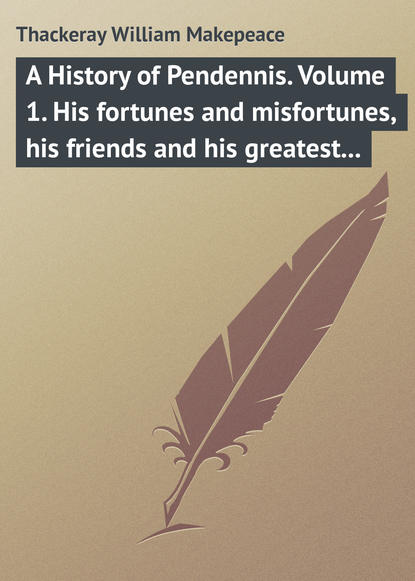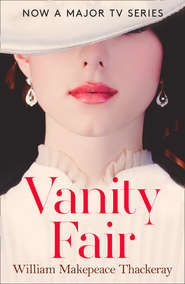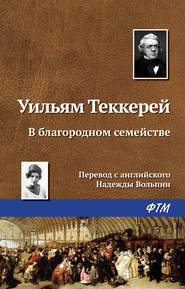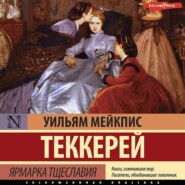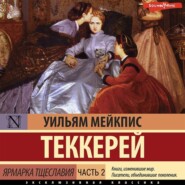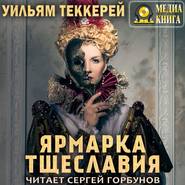По всем вопросам обращайтесь на: info@litportal.ru
(©) 2003-2024.
✖
A History of Pendennis. Volume 1. His fortunes and misfortunes, his friends and his greatest enemy
Настройки чтения
Размер шрифта
Высота строк
Поля
"Laura is looking at us, Mr. Pendennis," the young lady said. "I must go back to the company," and she ran off, leaving Mr. Pendennis to bite his nails in perplexity, and to look out into the moonlight in the garden.
Laura indeed was looking at Pen. She was talking with, or appearing to listen to the talk of, Mr. Pynsent, Lord Rockminster's son, and grandson of the Dowager Lady, who was seated in state in the place of honor, gravely receiving Lady Clavering's bad grammar, and patronizing the vacuous Sir Francis, whose interest in the county she was desirous to secure. Pynsent and Pen had been at Oxbridge together, where the latter, during his heyday of good fortune and fashion, had been the superior of the young patrician, and perhaps rather supercilious toward him. They had met for the first time, since they parted at the University, at the table to-day, and given each other that exceedingly impertinent and amusing demi-nod of recognition which is practiced in England only, and only to perfection by University men – and which seems to say, "Confound you – what do you do here?"
"I knew that man at Oxbridge," Mr. Pynsent said to Miss Bell – "a Mr. Pendennis, I think."
"Yes," said Miss Bell.
"He seems rather sweet upon Miss Amory," the gentleman went on. Laura looked at them, and perhaps thought so too, but said nothing.
"A man of large property in the county, ain't he? He used to talk about representing it. He used to speak at the Union. Whereabouts do his estates lie?"
Laura smiled. "His estates lie on the other side of the river, near the lodge gate. He is my cousin, and I live there."
"Where?" asked Mr. Pynsent, with a laugh.
"Why, on the other side of the river, at Fairoaks," answered Miss Bell.
"Many pheasants there? Cover looks rather good," said the simple gentleman.
Laura smiled again. "We have nine hens and a cock, a pig, and an old pointer."
"Pendennis don't preserve then?" continued Mr. Pynsent.
"You should come and see him," the girl said, laughing, and greatly amused at the notion that her Pen was a great county gentleman, and perhaps had given himself out to be such.
"Indeed, I quite long to renew our acquaintance," Mr. Pynsent said, gallantly, and with a look which fairly said, "It is you that I would like to come and see" – to which look and speech Miss Laura vouchsafed a smile, and made a little bow.
Here Blanche came stepping up with her most fascinating smile and ogle, and begged dear Laura to come and take the second in a song. Laura was ready to do any thing good-natured, and went to the piano; by which Mr. Pynsent listened as long as the duet lasted, and until Miss Amory began for herself, when he strode away.
"What a nice, frank, amiable, well-bred girl that is, Wagg," said Mr. Pynsent to a gentleman who had come over with him from Baymouth – "the tall one I mean, with the ringlets and the red lips – monstrous red, ain't they?"
"What do you think of the girl of the house?" asked Mr. Wagg.
"I think she's a lean scraggy humbug;" said Mr. Pynsent, with great candor. "She drags her shoulders out of her dress: she never lets her eyes alone: and she goes simpering and ogling about like a French waiting-maid."
"Pynsent, be civil," cried the other, "somebody can hear."
"Oh, it's Pendennis of Boniface," Mr. Pynsent said. "Fine evening, Mr. Pendennis; we were just talking of your charming cousin."
"Any relation to my old friend, Major Pendennis?" asked Mr. Wagg.
"His nephew. Had the pleasure of meeting you at Gaunt House," Mr. Pen said, with his very best air – the acquaintance between the gentleman was made in an instant.
In the afternoon of the next day, the two gentleman who were staying at Clavering Park were found by Mr. Pen on his return from a fishing excursion, in which he had no sport, seated in his mother's drawing-room in comfortable conversation with the widow and her ward. Mr. Pynsent, tall and gaunt, with large red whiskers and an imposing tuft to his chin, was striding over a chair in the intimate neighborhood of Miss Laura. She was amused by his talk, which was simple, straightforward, rather humorous and keen, and interspersed with homely expressions of a style which is sometimes called slang. It was the first specimen of a young London dandy that Laura had seen or heard: for she had been but a chit at the time of Mr. Foker's introduction at Fairoaks, nor indeed was that ingenuous gentleman much more than a boy, and his refinement was only that of a school and college.
Mr. Wagg, as he entered the Fairoaks premises with his companion, eyed and noted every thing. "Old gardener," he said, seeing Mr. John at the lodge – "old red livery waistcoat – clothes hanging out to dry on the gooseberry bushes – blue aprons, white ducks – gad, they must be young Pendennis's white ducks – nobody else wears 'em in the family. Rather a shy place for a sucking county member, ay, Pynsent?"
"Snug little crib," said Mr. Pynsent, "pretty cozy little lawn."
"Mr. Pendennis at home, old gentleman?" Mr. Wagg said to the old domestic. John answered, "No, Master Pendennis was agone out."
"Are the ladies at home?" asked the younger visitor. Mr. John answered, "Yes, they be;" and as the pair walked over the trim gravel, and by the neat shrubberies, up the steps to the hall-door, which old John opened, Mr. Wagg noted every thing that he saw; the barometer and the letter-bag, the umbrellas and the ladies' clogs, Pen's hats and tartan wrapper, and old John opening the drawing-room door, to introduce the new comers. Such minutiæ attracted Wagg instinctively; he seized them in spite of himself.
"Old fellow does all the work," he whispered to Pynsent. "Caleb Balderstone. Shouldn't wonder if he's the housemaid." The next minute the pair were in the presence of the Fairoaks ladies; in whom Pynsent could not help recognizing two perfectly well-bred ladies, and to whom Mr. Wagg made his obeisance, with florid bows, and extra courtesy, accompanied with an occasional knowing leer at his companion. Mr. Pynsent did not choose to acknowledge these signals, except by extreme haughtiness toward Mr. Wagg, and particular deference to the ladies. If there was one thing laughable in Mr. Wagg's eyes, it was poverty. He had the soul of a butler who had been brought from his pantry to make fun in the drawing-room. His jokes were plenty, and his good-nature thoroughly genuine, but he did not seem to understand that a gentleman could wear an old coat, or that a lady could be respectable unless she had her carriage, or employed a French milliner.
"Charming place, ma'am," said he, bowing to the widow; "noble prospect – delightful to us Cockneys, who seldom see any thing but Pall-mall." The widow said simply, she had never been in London but once in her life – before her son was born.
"Fine village, ma'am, fine village," said Mr. Wagg, "and increasing every day. It'll be quite a large town soon. It's not a bad place to live in for those who can't get the country, and will repay a visit when you honor it."
"My brother, Major Pendennis, has often mentioned your name to us," the widow said, "and we have been very much amused by some of your droll books, sir," Helen continued, who never could be brought to like Mr. Wagg's books, and detested their tone most thoroughly.
"He is my very good friend," Mr. Wagg said, with a low bow, "and one of the best known men about town, and where known, ma'am, appreciated – I assure you, appreciated. He is with our friend Steyne, at Aix-la-Chapelle. Steyne has a touch of the gout, and so, between ourselves, has your brother. I am going to Stillbrook for the pheasant-shooting, and afterward to Bareacres, where Pendennis and I shall probably meet;" and he poured out a flood of fashionable talk, introducing the names of a score of peers, and rattling on with breathless spirits, while the simple widow listened in silent wonder. What a man, she thought; are all the men of fashion in London like this? I am sure Pen will never be like him.
Mr. Pynsent was in the mean while engaged with Miss Laura. He named some of the houses in the neighborhood whither he was going, and hoped very much that he should see Miss Bell at some of them. He hoped that her aunt would give her a season in London. He said that in the next parliament it was probable that he should canvass the county, and he hoped to get Pendennis's interest here. He spoke of Pen's triumph as an orator at Oxbridge, and asked was he coming into parliament too? He talked on very pleasantly, and greatly to Laura's satisfaction, until Pen himself appeared, and, as has been said, found these gentlemen.
Pen behaved very courteously to the pair, now that they had found their way into his quarters; and though he recollected with some twinges a conversation at Oxbridge, when Pynsent was present, and in which after a great debate at the Union, and in the midst of considerable excitement produced by a supper and champagne-cup – he had announced his intention of coming in for his native county, and had absolutely returned thanks in a fine speech as the future member; yet Mr. Pynsent's manner was so frank and cordial, that Pen hoped Pynsent might have forgotten his little fanfaronade, and any other braggadocio speeches or actions which he might have made. He suited himself to the tone of the visitors then, and talked about Plinlimmon and Magnus Charters, and the old set at Oxbridge, with careless familiarity and high-bred ease, as if he lived with marquises every day, and a duke was no more to him than a village curate.
But at this juncture, and it being then six o'clock in the evening, Betsy, the maid, who did not know of the advent of strangers, walked into the room without any preliminary but that of flinging the door wide open before her, and bearing in her arms a tray, containing three tea-cups, a tea-pot, and a plate of thick bread-and-butter. All Pen's splendor and magnificence vanished away at this – and he faltered and became quite abashed. "What will they think of us?" he thought: and, indeed, Wagg thrust his tongue in his cheek, thought the tea infinitely contemptible, and leered and winked at Pynsent to that effect.
But to Mr. Pynsent the transaction appeared perfectly simple – there was no reason present to his mind why people should not drink tea at six if they were minded, as well as at any other hour; and he asked of Mr. Wagg, when they went away, "What the devil he was grinning and winking at, and what amused him?"
"Didn't you see how the cub was ashamed of the thick bread-and-butter? I dare say they're going to have treacle if they are good. I'll take an opportunity of telling old Pendennis, when we get back to town," Mr. Wagg chuckled out.
"Don't see the fun," said Mr. Pynsent.
"Never thought you did," growled Wagg between his teeth; and they walked home rather sulkily.
Wagg told the story at dinner very smartly, with wonderful accuracy of observation. He described old John, the clothes that were drying, the clogs in the hall, the drawing-room, and its furniture and pictures; – "Old man with a beak and bald head —feu Pendennis, I bet two to one; sticking-plaster full-length of a youth in a cap and gown – the present Marquis of Fairoaks, of course; the widow when young in a miniature, Mrs. Mee; she had the gown on when we came, or a dress made the year after, and the tips cut off the fingers of her gloves which she stitches her son's collars with; and then the sarving maid came in with their teas; and so we left the earl and the countess to their bread-and-butter."
Blanche, near whom he sate as he told this story, and who adored les hommes d'esprit, burst out laughing, and called him such an odd, droll creature. But Pynsent, who began to be utterly disgusted with him, broke out in a loud voice, and said, "I don't know, Mr. Wagg, what sort of ladies you are accustomed to meet in your own family, but by gad, as far as a first acquaintance can show, I never met two better-bred women in my life, and I hope, ma'am! you'll call upon 'em," he added, addressing Lady Rockminster, who was seated at Sir Francis Clavering's right hand.
Sir Francis turned to the guest on his left, and whispered, "That's what I call a sticker for Wagg." And Lady Clavering, giving the young gentleman a delighted tap with her fan, winked her black eyes at him, and said, "Mr. Pynsent, you're a good feller."
After the affair with Blanche, a difference ever so slight, a tone of melancholy, perhaps a little bitter, might be perceived in Laura's converse with her cousin. She seemed to weigh him and find him wanting too; the widow saw the girl's clear and honest eyes watching the young man at times, and a look of almost scorn pass over her face, as he lounged in the room with the women, or lazily sauntered smoking upon the lawn, or lolled under a tree there over a book which he was too listless to read.
"What has happened between you?" eager-sighted Helen asked of the girl. "Something has happened. Has that wicked little Blanche been making mischief? Tell me, Laura."
"Nothing has happened at all," Laura said.
"Then why do you look at Pen so?" asked his mother quickly.
"Look at him, dear mother!" said the girl. "We two women are no society for him: we don't interest him; we are not clever enough for such a genius as Pen. He wastes his life and energies away among us, tied to our apron-strings. He interests himself in nothing; he scarcely cares to go beyond the garden-gate. Even Captain Glanders and Captain Strong pall upon him," she added, with a bitter laugh; "and they are men, you know, and our superiors. He will never be happy while he is here. Why, is he not facing the world, and without a profession?"
"We have got enough, with great economy," said the widow, her heart beginning to beat violently. "Pen has spent nothing for months. I'm sure he is very good. I am sure he might be very happy with us."
"Don't agitate yourself so, dear mother," the girl answered. "I don't like to see you so. You should not be sad because Pen is unhappy here. All men are so. They must work. They must make themselves names and a place in the world. Look, the two captains have fought and seen battles; that Mr. Pynsent, who came here, and who will be very rich, is in a public office; he works very hard, he aspires to a name and a reputation. He says Pen was one of the best speakers at Oxbridge, and had as great a character for talent as any of the young gentlemen there. Pen himself laughs at Mr. Wagg's celebrity (and indeed he is a horrid person), and says he is a dunce, and that any body could write his books."
"I am sure they are odious and vulgar," interposed the widow.





